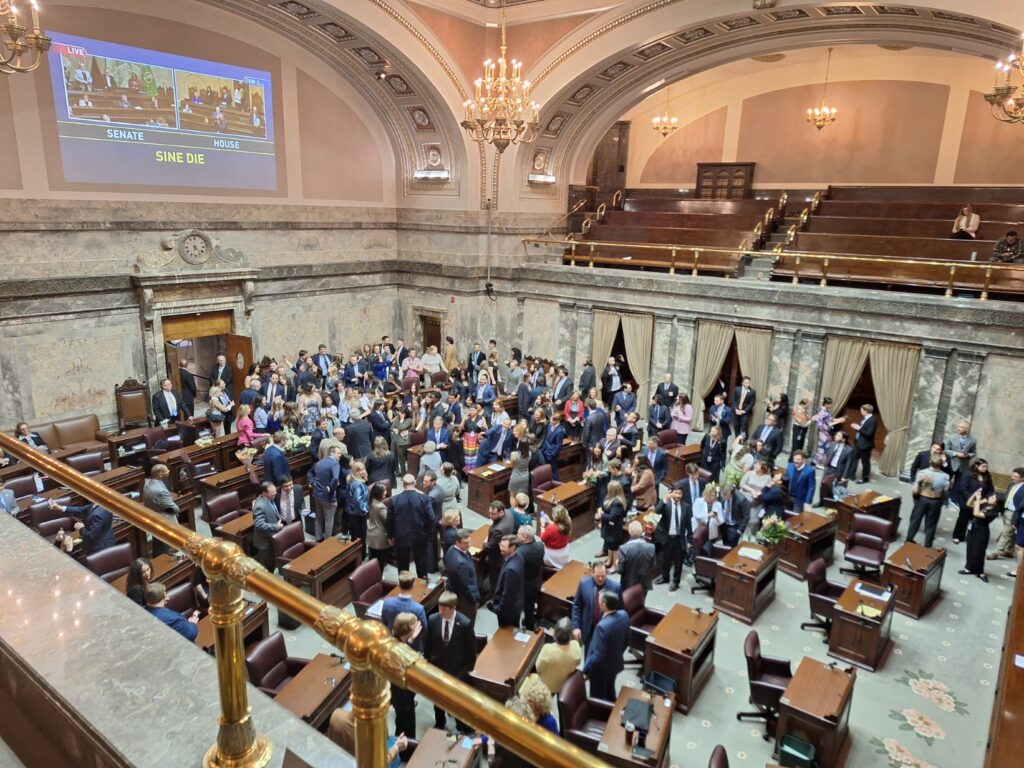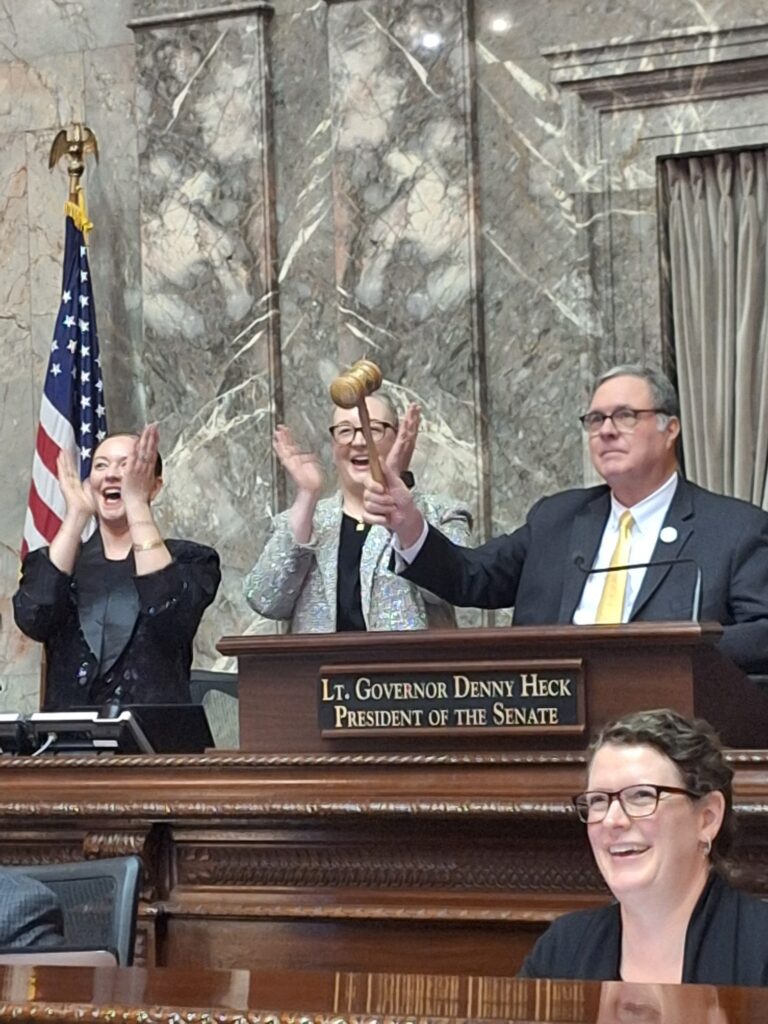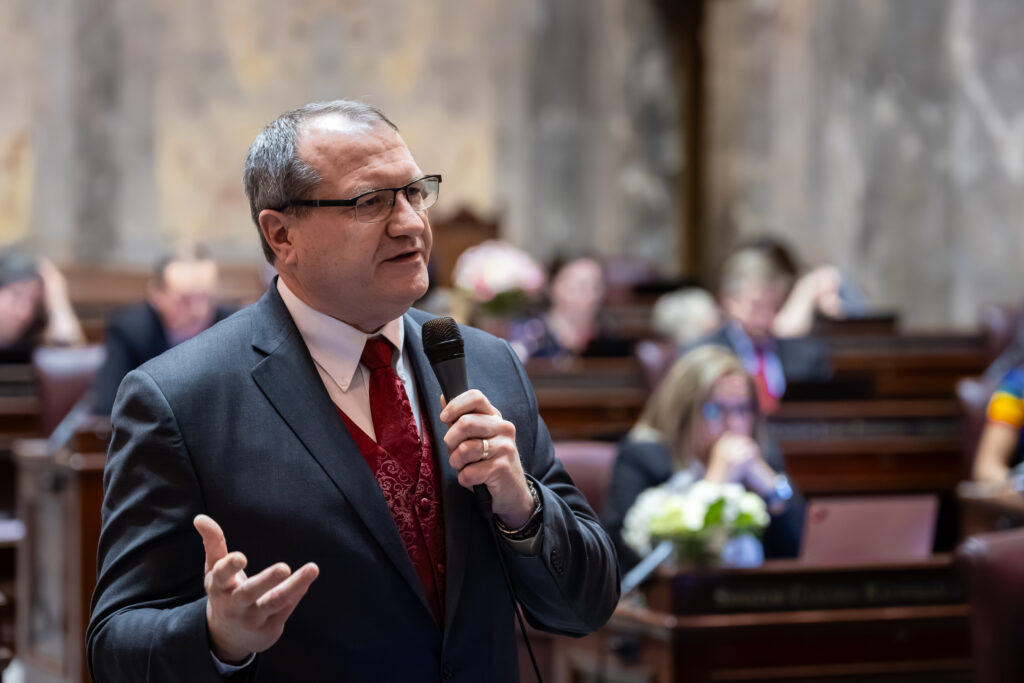Note: The following e-newsletter was sent to Sen. Leonard Christian’s subscribers May 2, 2025. To subscribe to Sen. Christian’s e-newsletters, click here.
 Staffers and well-wishers swarmed the Senate floor as the 2025 legislative session ended Sunday night.
Staffers and well-wishers swarmed the Senate floor as the 2025 legislative session ended Sunday night.
Dear Friends and Neighbors,
 Our 2025 legislative session in Olympia has adjourned — and thank goodness. Over the course of 105 days, the Legislature passed so many taxes and fees, and so many bills designed to force Seattle attitudes on the rest of us, that it will take the state years to recover, if at all. This was one of the most troubling sessions the Washington Legislature has ever held, and what makes the outcome so frustrating is that none of it was necessary.
Our 2025 legislative session in Olympia has adjourned — and thank goodness. Over the course of 105 days, the Legislature passed so many taxes and fees, and so many bills designed to force Seattle attitudes on the rest of us, that it will take the state years to recover, if at all. This was one of the most troubling sessions the Washington Legislature has ever held, and what makes the outcome so frustrating is that none of it was necessary.
Right now, we’re waiting for the governor to weigh in. Our new governor, Bob Ferguson, has signaled that he is uncomfortable with his party’s fixation on tax increases and disdain for reasonable spending reductions. There’s a chance the governor could spare us some of our pain by vetoing the budget and forcing a do-over in a special session. While we wait for him to decide, in this final e-newsletter of the session, I want to give you a rundown on what happened this year. It wasn’t pretty.
Setup for disaster
This was the year we finally got to see what happens when “progressives” hold the reins in the Legislature and there is nothing to keep them in check. For the last eight years, Democrats have held full control of the Washington Legislature – the House, the Senate and the governor’s office. State expenditures have skyrocketed, doubling over the last decade as our colleagues drove spending to the max by repeating every budgeting mistake in the book. This year their irresponsibility finally caught up with them, as the state found itself with a deficit, at least on paper.
It wasn’t that we were broke. We had more than enough to meet the state’s basic needs without a tax increase. But we were about $7 billion short of the amount needed for all the new spending our colleagues had planned to enact this year – and they wanted to spend even more. At the same time, Democrats broadened their majorities in the last election to the point they had “supermajorities” in both chambers. With 60 percent of the vote in the House and Senate, they could pass nearly anything they wanted, and they could ignore the opposition of Republicans and the people they serve. The sad part is they took full advantage.
During my first session in the state Senate, I spoke frequently on the floor, becoming known for my signature line: “Bad bill, vote no.”
Biggest tax increase in state history
The numbers kept changing right up to the end. Ultimately our colleagues passed a $78 billion operating budget, an 8.2 percent increase over the last one. This was supported by the biggest tax increase in the history of the state, a total $12.9 billion on the state and local levels over the next four years. The most significant elements were:
- Business and occupations tax increases, singling out some disfavored industries for especially punitive rates (HB 2081),
- Sales tax expansion, extending the sales tax to products and businesses that had been exempt, including temp agencies, digital advertising and tobacco cessation products (SB 5814),
- Higher rates for capital gains and estate taxes (SB 5813),
- Elimination of certain tax incentives (SB 5794),
- New taxing authority for school districts (SB 2049), giving them the ability to submit substantially higher property tax levies for voter approval, and
- A new tax on the sale of electric-vehicle credits (HB 2077), written in such a way that it applies only to Tesla. Take that, Elon Musk!
Keep in mind, it all comes back to you, one way or another, directly and indirectly. Ultimately business taxes are passed on to consumers, and the more money that government siphons from the economy, the weaker the economy becomes, reducing job opportunities – and so on. Other taxes and fees also will take a bite. A gas-tax increase and a tougher low-carbon fuel standards law will add about 50 cents a gallon to Washington’s already-high gas prices by 2028. Washington residents will be nickel-and-dimed by higher hunting and fishing licenses, higher Discover Pass fees and more.
Left turn on policy
Meanwhile, we saw a continuation of our colleagues’ efforts to advance a sharply partisan ideological agenda. We were able to marshal public opposition to defeat some of their worst legislation, including a proposal for intrusive and duplicative state woodstove regulation, a plan to let property taxes grow three times faster than they already do, and new rules for initiative campaigns that would have squelched the public’s ability to fight back. But what passed this year was deadly enough, including:
- Gutting the people’s initiative on parental rights in the public schools, and increasing Olympia’s ability to dictate to local school districts on curriculum and transgender participation in girls’ sports (HB 1296),
- Unemployment benefits for striking workers, giving unions the upper hand in labor negotiations and an incentive to manufacturers to locate anywhere but Washington (SB 5041),
- More power for health officials in the next pandemic, with a bill written so broadly and vaguely that it should make all of us nervous (HB 1531),
- Infringing on Second Amendment rights with a “permit to purchase” bill requiring completion of a gun-safety course before a firearm can be purchased, thus placing a condition on the exercise of a right guaranteed by the state and federal constitutions (HB 1163),
- Expanding the state’s taxpayer-funded “reparations” program, which provides low-interest loans for home purchases to people of certain races and ethnic backgrounds while excluding others, a probable violation of the 14th Amendment to the U.S. Constitution, should anyone choose to sue (HB 1696),
- Doubling down on Washington’s shortage of affordable housing by imposing rent control, which will eliminate any incentive to build new rental units, and give landlords an incentive to sell rental properties (HB 1217),
And many, many more.
Capital budget funds local projects
One of the few bright spots this year was the passage of a capital budget (SB 5195) that funds infrastructure and public works projects statewide. Let me point out that this budget is financed primarily with long-term bonds and is not directly affected by this year’s tax increases. This year’s $7.6 billion budget did a good job of distributing projects across the state, and for our 4th Legislative District it includes:
- $5 million for the Healing Lodge of the Seven Nations behavioral health center,
- $1.03 million for Mission Avenue frontage improvements,
- $1 million for the Plante’s Ferry Sports Complex in Spokane Valley,
- $938,000 for road improvements at Mt. Spokane State Park,
- $843,000 for field improvements at the HUB Sports complex in Liberty Lake,
- $700,000 for disability access and asbestos abatement at Mt. Spokane,
- $515,000 for the Partners Inland Northwest Resource Center,
- $500,000 for expansion of Balfour Playground and Spray Park in Spokane Valley,
- $415,000 for new basketball and pickleball courts at Spokane Valley’s Underhill Park,
- $338,000 for the Freedom Center anti-trafficking service hub and headquarters in Spokane Valley,
- $225,000 for Trent Elementary community upgrades,
- $206,000 for the Spokane Valley Heritage Museum,
- $120,000 for Newman Lake revitalization,
- $114,000 for cleanup at the Colbert landfill, and
- $98,000 for repairs and improvements at the Inland Grange in Elk.
A session of misguided priorities, missed opportunities
This was a difficult session for all of us, for taxpayers across the state and for those of us doing battle on the front lines in Olympia. This was my first session in the Senate, and as ranking Republican on the Senate Human Services Committee, I fought proposals to weaken our juvenile rehabilitation system and reduce sentencing. In a year when few Republican proposals advanced, I am proud to report that I passed SB 5506, a bill extending the effective date of new licensing regulations at residential private schools. But there were so many that deserved attention and failed even to get a hearing.
This was a session of unjustifiable taxes and missed opportunities, from needed reforms in juvenile justice to a long-overdue crackdown on fentanyl. Our colleagues’ failure to make any meaningful course corrections spells big trouble the next time we write a budget, especially if we fall into recession. This year’s school-levy legislation is especially troubling, because it opens the state to another school-financing lawsuit like the McCleary case of 2007, and it could be used as an excuse to impose an income tax. The dismal result this year demonstrates that if we are going to make progress in Olympia, the first thing we need to change is legislative leadership. Washington deserves better than this.
 Final gavel falls to end the session, April 27.
Final gavel falls to end the session, April 27.
A final note: With this newsletter, we revert to a monthly schedule for the remainder of the year. Keep reading to stay in touch with developments from the Legislature. Though we have adjourned, I continue to work for you year-round. I look forward to hearing from you.
Thanks for reading,
Leonard Christian
4th Legislative District
Contact me!
If you have a comment about state government, or a concern with a state agency, I hope you will reach out to my office. My most important duty is to serve you.
 Mailing address: Post Office Box 40404, Olympia, WA 98504
Mailing address: Post Office Box 40404, Olympia, WA 98504
Email: Leonard.Christian@leg.wa.gov
Phone: (360) 786-7606
Leave a message on the Legislative Hotline: 1 (800) 562-6000












